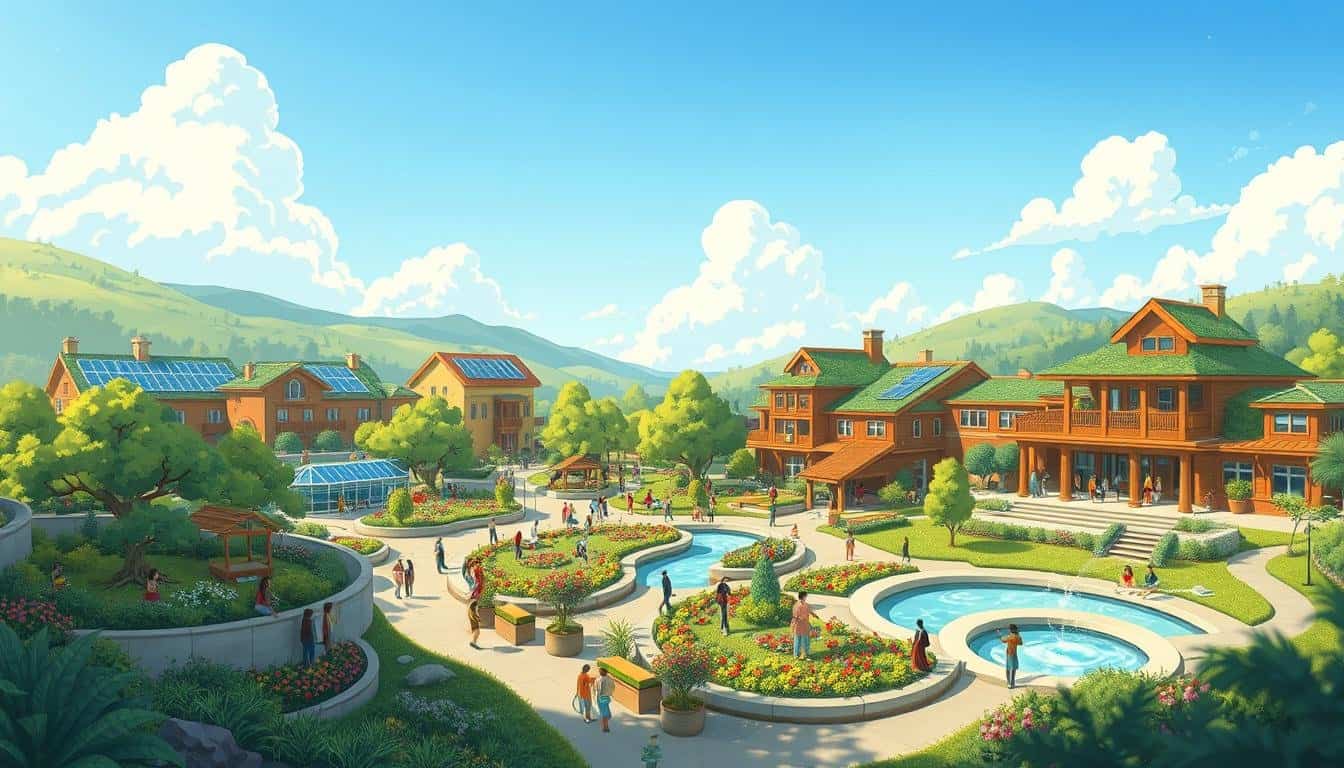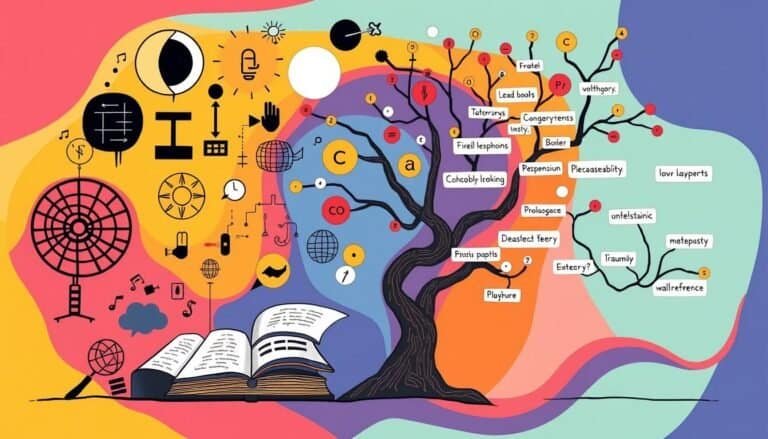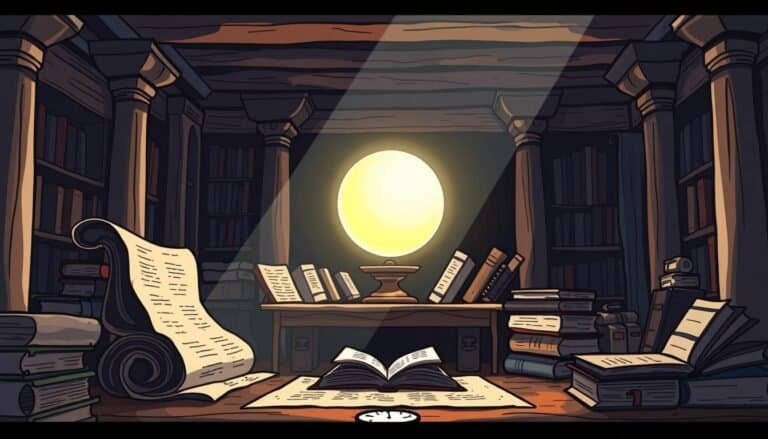The Concept of Utopia in Political Philosophy
What if the perfect society is closer than we think? The idea of Utopia has been a key part of political thought for centuries. It makes us think about the systems we live in. From ancient thinkers like Plato to today’s thinkers, like John Rawls, many have imagined perfect societies.
These visions challenge our current political systems. This section will look at how the idea of Utopia helps us understand governance. It will also explore the role of Utopia in today’s political debates.
Key Takeaways
- The exploration of utopia in political philosophy spans from Plato to modern theorists like John Rawls.
- Utopian visions often serve as critiques of current political systems, revealing their limitations.
- Historical perspectives enrich our understanding of how utopian thought has evolved over time.
- The intersection of utopian ideals and contemporary democracy raises questions about feasibility.
- The ongoing dialogue about realistic versus idealistic visions aids in navigating current political challenges.
Introduction to Utopianism in Political Thought
Utopianism is a key idea in political thought. It helps us think about how we can make societies better. It challenges the current political systems, pushing for change and new ways of governing.
Many different views on Utopian Political Theory exist. Each one shows how our dreams and needs change over time.
For a long time, Utopianism and Political Philosophy have shaped how we talk about government and society. Many thinkers have used utopian ideas to dream up new futures. They showed us the power of hope and the chance for change.
This makes us think deeply about what the perfect society would be like. And how we can make it happen.
- The history of Utopian thought makes us look at how old ideas affect today’s problems.
- Utopianism makes us question the current state of things, offering a way to criticize society.
- Big issues like wealth gaps and climate change show why we need utopian thinking in politics.
Utopian visions give us hope during tough times. They show us different ways to fight for justice and fairness. By studying thinkers like Rousseau and Marx, we learn how utopian ideas have shaped politics and tackled social problems.
The Historical Roots of Utopia
Exploring utopian ideas takes us back to ancient times. Early thinkers set the stage for the Utopia Theory in Political Philosophy. These historical roots show how utopian ideals have shaped political thought over the years.
Utopia in Plato’s Republic
In “Republic,” Plato talks about an ideal state led by philosopher-kings. He wonders what justice means in a well-organized society. His vision is of a perfect society ruled by wisdom and reason.
Plato’s ideas are key to understanding Utopia in Political Thought. He believed in the importance of knowledge and virtue for governing. He envisioned a society where everyone had a role and worked together smoothly.
Thomas More’s Vision of Utopia
Thomas More’s “Utopia,” published in 1516, paints a picture of a fictional island. This island critiques the social norms of his time. It talks about property, social structure, and how to govern.
More’s work shows how utopian ideas can challenge the status quo. It presents a model for improving human life. Through his work, we see how utopian thought moves from ideas to practical plans for society.
| Philosopher | Key Work | Utopian Concept | Impact on Political Thought |
|---|---|---|---|
| Plato | Republic | Philosopher-kings | Foundation for ideal governance |
| Thomas More | Utopia | Fictional island society | Critique of existing socioeconomic structures |
Utopian Political Theory and Its Evolution
The story of Utopian political theory is like a rich tapestry. It’s made from historical events, new ideas, and changing dreams for society. The Enlightenment was a big turning point, making thinkers question old ways. They brought new ideas that changed how we see politics today.
Impact of Enlightenment on Utopian Ideals
The Enlightenment brought new ideas like rational thought and the fight for rights. Thinkers like John Locke and Jean-Jacques Rousseau wanted better political systems. They pushed for fairness and equality, starting a new wave of Utopian thinking.
- Focus on *social justice* and individual freedoms.
- Critique of colonial and oppressive systems.
- Efforts to create a harmonious society through *rational political frameworks*.
Shift from Classical to Modern Utopianism
Utopia has changed a lot over time. Early ideas were about perfect societies that didn’t always match real life. Now, we think about making our communities better, focusing on fairness, equality, and taking care of the planet. This change includes:
| Characteristics | Classical Utopianism | Modern Utopianism |
|---|---|---|
| Focus | Idealized society | Practical solutions to contemporary issues |
| Development | Static concepts | Evolving ideas reflecting societal changes |
| Thematic Concerns | Metaphysical ideals | Social justice and environmental sustainability |
| Approaches | Philosophical idealism | Interdisciplinary analysis incorporating various fields of study |
Utopian political theory keeps evolving, meeting the challenges of today’s world. It blends history, current issues, and new ideas. This keeps the dream of a better world alive.
The Concept of Utopia in Political Philosophy
Utopia has long fascinated thinkers across history. It blends utopianism with political philosophy, offering a unique view of an ideal society. This view helps us look at how we govern ourselves today. Plato and Thomas More were among the first to explore this idea, sparking debates on what a perfect state looks like and if it’s possible to achieve it.
In their works, Plato in Republic and More in Utopia analyzed governance deeply. They let readers question our current systems. This sparked ongoing debates on what’s possible versus what’s realistic. From the sixteenth century to the late twentieth, thinkers like John Rawls brought utopian ideas back into the spotlight, focusing on a “realistic utopia.”
Thoughts on utopia have evolved, showing a split between literary and political views. Literature inspires dreams, while political ideas push us to think deeply about how we govern. In schools, anti-utopian views are taught, shaping students’ views through works by authors like Aldous Huxley and George Orwell.
Some argue that utopian dreams are too idealistic and could lead to dystopian outcomes. They point out the difficulties in uniting diverse groups for a common goal. Still, the dream of a perfect society keeps pushing us to think about how utopia and reality can meet, especially in democracies.
| Philosopher | Key Work | Utopian Concept |
|---|---|---|
| Plato | Republic | Ideal Society |
| Thomas More | Utopia | Critique of Contemporary Society |
| John Rawls | A Theory of Justice | Realistic Utopia |
| Marx | The Communist Manifesto | Classless Society |
| Alessandro Ferrara | Political Philosophy | Utopia and Democracy |
Utopian Ideals in Politics
Utopian ideals are key in shaping talks on social justice and equality in politics. They challenge old power structures, pushing for everyone to be included and treated fairly. Philosophers and thinkers add to our understanding of these ideals.
Social Justice and Equality in Utopian Thought
At the heart of Utopian dreams is the fight for social justice. In Brazil, participatory city budgeting shows how communities can work together for fairness. In Spain, Mondragon cooperatives are another example, showing how equality can be lived out in daily life.
These examples show how we can build systems that are fair for everyone. A guaranteed basic income is another idea to tackle economic inequality. It shows a step towards a more just society.
Critiques of Utopian Models
Even though Utopian ideas are inspiring, they face many challenges. Some say they’re too ambitious and hard to put into action. Critics worry that these ideals might become too controlling if not done right.
This shows how careful we must be when trying to make Utopian dreams come true. We need to think hard about how they would work in real life.
| Utopian Models | Advantages | Critiques |
|---|---|---|
| Participatory Budgeting in Brazil | Enhances community engagement, empowers local voices | May lack broader structural changes to power dynamics |
| Mondragon Cooperatives | Promotes economic democracy and shared ownership | Scaling remains a challenge in larger economies |
| Guaranteed Basic Income | Addresses poverty, offers financial security | Potential dependency and financial sustainability concerns |
Utopianism and Political Philosophy Today
Utopianism is still a big part of today’s discussions, affecting many areas of Political Philosophy. It shows up in different ways, like in social theory, literature, and real-life actions. Each type plays a big role in shaping how we talk about and work towards a fairer society.
Many modern ideas have their own Utopian dreams. For example, liberals believe in free trade, owning property, and democracy. On the other hand, ideologies like fascism, socialism, and communism have their own views, often looking back or forward in time. Utopian republicanism, inspired by Thomas More, focuses on equality and community, drawing from old philosophical ideas.
Utopianism does two main things. It acts as a vision for a better society and meets our need for improvement. It encourages people to think about other ways things could be, leading to efforts for big changes. This often creates communities where people work together towards a better world.
In Political Philosophy, there are debates about how individual rights and group life connect. Some focus on personal freedom, while others look at the power of groups. These debates highlight the complexity of how we organize society and the role of reason in our social lives.
| Aspect | Utopian Social Theory | Literary Utopias and Dystopias | Utopian Practice |
|---|---|---|---|
| Definition | Theoretical frameworks for ideal societies | Imaginary representations, exploring societal possibilities | Real-life applications in communities and movements |
| Role in Political Philosophy | Critiques existing structures, proposes alternatives | Stimulates discussion and reflection on societal ideals | Encourages collaboration towards common goals |
| Examples | Marxist theory, social justice models | Books like “Utopia” by Thomas More and “1984” by Orwell | Intentional communities and co-housing initiatives |
The Role of Technology in Utopian Visions
Exploring how technology and Utopian visions work together shows us complex ideas about what we hope for in society. Technology is a big part of these dreams, but it also makes us question them. Science fiction stories show us different views on what could be, helping us think about the future.
Science Fiction vs. Utopia: A Contrast
Science fiction shows us what we hope and fear about technology. It can picture bad futures from too much tech or show us new ideas for a better world. Important themes include:
- Technological determinism: This idea says technology changes how we live and think, linking tech to Utopian dreams.
- The Californian Ideology: This mix of free market ideas and against-authority views came from Silicon Valley. It shows how tech dreams can fit with certain political views.
- Cyber-utopianism: This idea links tech progress with making society better, often ignoring the need for government rules.
Today, the idea of a tech utopia keeps growing, showing we still believe in making things better with new tech. Talking about tech and Utopian ideas helps us think about big issues like AI, watching over us, and new kinds of living things. These talks show our ongoing search for a perfect world with the help of technology.
| Theme | Description | Context |
|---|---|---|
| Technological Determinism | Technology shapes social and cultural landscapes. | Roots in Utopian literature and social theory. |
| Cyber-Utopianism | Belief in technology as a path to societal improvement. | Emergence in the late 20th century, particularly during the dot-com boom. |
| Californian Ideology | Combines techno-utopianism with libertarian economics. | A significant aspect of Silicon Valley’s cultural narrative. |
| Critique of Utopian Ambitions | Dystopian narratives caution against overreliance on technology. | Science fiction literature often explores these themes. |
These different views make us talk about technology’s role in creating a perfect society or warning us about its dangers. Technology keeps pushing us to dream big and also makes us think hard about what we’re doing. It’s a key part of thinking about the future and what we want it to be.
Challenges and Criticisms of Utopian Vision in Politics
The idea of Utopianism in Political Thought has both good and bad sides. It can inspire people to work towards a better future. But, it can also lead to big problems because of unrealistic ideas.
Some critics, like Karl Popper, say that having set goals can lead to plans that don’t work well. They point out the Challenges of Utopian Vision. These plans often ignore different opinions, leading to the silence of those who disagree. This can cause the use of force to stop disagreements, which is very worrying.
Popper believes that Utopianism is too strict and doesn’t allow for new ideas. Many think we should see Utopianism as a way to imagine a changing future. Oscar Wilde said, “Utopia is essential to any map,” showing we need to aim for something better without being too rigid.
| Critiques of Utopianism | Description |
|---|---|
| Blueprint Utopianism | Fixed ideals leading to potential violence and suppression of alternative viewpoints. |
| Plurality Assumption | Overlooks diverse perspectives, aggravating conflict and tension. |
| Progressive Utopian Thought | Focuses on an ever-evolving vision rather than predetermined outcomes. |
| Historical Context | Emerging concepts of Utopia through literature from ancient Greece to the Renaissance. |
Utopian stories have been around since ancient times, seen in works like Plato’s Republic and Thomas More’s Utopia. These stories show the wide range of Utopian ideas, from perfect worlds to unrealistic dreams. Knowing this helps us understand the Challenges of Utopian Vision in politics.
Conclusion
Exploring Utopian Political Theory shows its key role in changing political thought. It makes us think about and fix today’s big issues. Even with challenges and doubts, utopian ideas keep pushing us towards justice and equality.
Robert Nozick’s idea of meta-utopia makes us rethink what the perfect world looks like. He says we can make our own worlds, showing that one utopia can’t fit everyone’s dreams. This shows how complex our dreams of a better life can be.
Thinkers and activists find inspiration in utopian ideas. It’s crucial to keep aiming high for ourselves. Utopian Political Theory helps us see a better future and work towards it. By accepting different views of Utopia, we can all work together towards a better world, each in our own way.
Source Links
- The interaction of political and utopian thought
- Political Uses of Utopia | Columbia University Press
- Plato on utopia
- Visions of Utopia
- Thesis final draft lmao
- Utopianism, Ancient and Modern
- Utopianism – Routledge Encyclopedia of Philosophy
- The Meaning of Utopia
- Utopianism (Chapter 11) – The Cambridge History of Political Thought 1450–1700
- The Normative Role of Utopianism in Political Philosophy
- Utopianism, Conservatism, Ideal Theory: Who is Trying to Get Where, From Here?
- Utopianism as a political ideology: An attempt at redefinition
- Political Philosophy: Methodology | Internet Encyclopedia of Philosophy
- Technological utopianism
- Rawls_theory_of_justice
- On Technological Utopianism – VoegelinView
- Popper’s Critique of Utopianism and Defence of Negative Utilitarianism
- Monthly Review | The Utopian Vision of the Future (Then and Now): A Marxist Critique
- What is Utopia? The Meta-Utopian Argument
- Conclusion – Practical Utopia







